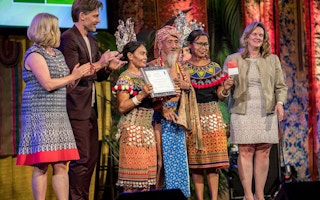It’s often said that indigenous people are the best stewards of the forest. Here’s the proof.
During the recent United Nations General Assembly Climate Summit in New York, United States, global leaders focused on natural climate solutions — maintaining and restoring natural areas like forests and wetlands. Studies estimate that natural climate solutions can help reduce carbon emissions and store carbon in the landscape, delivering 37 per cent of the emissions reductions the globe needs to stop dangerous climate change.
Indigenous leadership is a critical nature-based solution. Indigenous peoples live traditional lifestyles and have a rich understanding of their environments. They are custodians of the lands across which they have hunted, gathered and farmed for generations and can make huge contributions through practicing sustainable land management for both protection and economic production.
According to the UN Development Program, globally deforestation is three to five times lower inside indigenous territories than outside. Therefore, indigenous land rights are essential to mitigate climate change.
The prestigious Equator Prize rewards indigenous groups that are managing their lands and waters in a climate friendly way. This year 22 groups from 18 countries were awarded the prestigious prize and invited to an award ceremony in New York. Indonesia was proudly represented by the Sungai Utik Dayak Iban longhouse community from West Kalimantan.
“The land is our mother, the forest is our father and the water is our blood” said Apai Janggut, customary leader of Sungai Utik longhouse. “We depend on our land for fruits, for fields, for water, and have defended our forests against illegal logging. We only cut trees for our own necessity, not for profit”.
The community has maintained about 9,500 hectares of land near the source of the Utik River since before it moved into the longhouse in 1980. Two thirds of this land is covered in pristine rainforest — creating a home for plants and animals, providing a year round supply of clean water for the community and other users and storing some 1.31 million tons of carbon.
“
Globally, deforestation is three to five times lower inside indigenous territories than outside.
The rest of the land is managed in a traditional shifting cultivation manner — growing food crops on one plot for a few years before moving to another area, leaving the land to regenerate as forest. This is a natural climate solution in action. The community of Sungai Utik is one of the rare remaining rainforest cultures of Dayak Iban.
Well-known as a forest guarding community, the community and its forebears lived in the Sungai Utik hamlet for over 130 years, before moving to its current longhouse. The 214-meter longhouse accommodates 318 people who live communally, and share a common and deeply held objective to protect their forest and maintain their Iban traditions and identity.
“I take the children to the forest, and teach them to preserve and protect it,” said Kristiana Banang, a teacher and mother who was also in New York to receive the award.
“But we lack legal acknowledgement of our ownership of this land,” said Raymundus Remang, the village head.
In 2015, President Joko “Jokowi” Widodo launched a visionary social forestry program, committed to granting ownership and use rights to local communities and customary groups, for 12.7 million ha of state land. But progress has been slow.
Data from the Environment and Forestry Ministry for 2016 to 2019 shows that only 54 communities have been granted these rights, covering only 24,216 ha of land (under the scheme of customary forests).
Acquiring land rights involves a complicated process on the ground because a bylaw must first be issued to acknowledge the existence of an indigenous community; a regent’s decree also must validate the community, and the regent’s recommendation to the above ministry is also required for the said community to acquire its land right.
The people of Sungai Utik hope to use the momentum of becoming Equator and Kalpataru prize winners to raise awareness of their contribution to mitigate climate change, and get the much needed support and assistance.
The process to secure legal rights to the land will involve, among other things, understanding exactly what the law allows and mandates, knowing which parties should be involved, where letters of permission and support should come from and related strategies.
These lessons, when learned by the above community, will be directly applicable by similar communities in Indonesia seeking to secure their land rights.
A decade after tropical forests entered international climate negotiations, translating global commitments into local actions has proved difficult. Nature-based solutions point to a clear way forward. Our president was visionary with his 12.7 million-ha commitment.
President Jokowi’s vision and the efforts of the Sungai Utik community are recognised by the world.
Let’s finish the job.
Yani Saloh is an independent consultant on nature-based solutions to climate change, and nominator for the 2019 Kalpataru and Equator environment awards.








